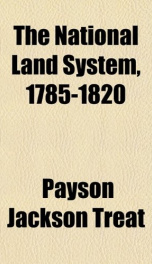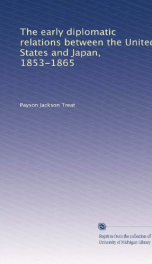the national land system 1785 1820

Purchase of this book includes free trial access to www.million-books.com where you can read more than a million books for free. This is an OCR edition with typos. Excerpt from book: CHAPTER II THE ORIGIN OF THE FEDERAL LAND SYSTEM The acquisition of the public domain made possible a national system, and Congress was called upon to regulate the disposal of the western lands. The discussions of the past few years had revealed a general agreement of opinion as to the policy which should control the land system. The lands were considered primarily as a source of revenue, and Congress was expected to so provide that the lands would serve to relieve the financial burdens of the struggling nation. Every thoughtful citizen could appreciate the financial possibilities of the new domain, although the tendency was to exaggerate the immediate value of the vacant lands. Speculations in land were not new in this country, great schemes had been under discussion in the western country even before the Revolution, and the New England colonies had at times profited through their land sales. To the south Virginia 1 and North Carolina2 had opened land offices and expected to increase their annual revenue and to sink their public debt. It was very natural, therefore, for persons in and out of Congress to look upon the western lands as a valuable asset, which should be carefully managed. These acres were tobe sold for a fair sum, and not to be given away as had so often been the case in colonial days. i Hening, X, 60-65. 2 N. C. Records, 24:43. Congress could not prepare a plan of disposal for the lands until the national title was clear to at least one section of the territory, and it was not until March, 1784, that the New York and Virginia cessions had quieted all claims to the southern portion of the old Northwest, while even then the Indian title remained to be dealt with. But before this time a plan had been published which merits more than a passing notice. Early...
Users who have this book
Users who want this book
What readers are saying
What do you think? Write your own comment on this book!
write a commentif you like the national land system 1785 1820 try:
Other books by this author
Do you want to read a book that interests you? It’s EASY!
Create an account and send a request for reading to other users on the Webpage of the book!


